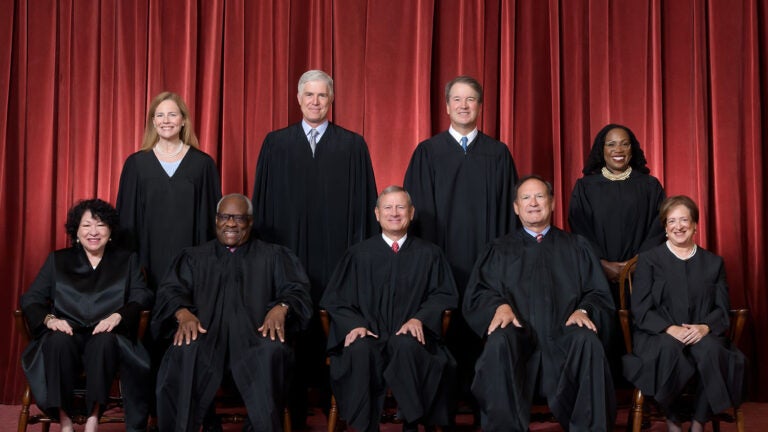
Formal group photograph of the Supreme Court as it was been comprised on June 30, 2022 after Justice Ketanji Brown Jackson joined the Court. The Justices are posed in front of red velvet drapes and arranged by seniority, with five seated and four standing.
Seated from left are Justices Sonia Sotomayor, Clarence Thomas, Chief Justice John G. Roberts, Jr., and Justices Samuel A. Alito and Elena Kagan.
Standing from left are Justices Amy Coney Barrett, Neil M. Gorsuch, Brett M. Kavanaugh, and Ketanji Brown Jackson.
Credit: Fred Schilling, Collection of the Supreme Court of the United States
The Supreme Court’s term is ending. Here are the decisions to watch out for and USC experts to know
The U.S. Supreme Court is nearing the end of what experts predict will be one of its most consequential terms in recent history. The justices will soon issue decisions on issues such as presidential immunity, abortion access, free speech on social media, gun control, environmental protections, and the scope of federal agency power.
USC experts are available for comment and analysis. This is the first in a two-part series discussing the high court’s imminent decisions.
Contact: Nina Raffio, raffio@usc.edu or (213) 442-8464; USC Media Relations, uscnews@usc.edu or (213) 740-2215
Abortion
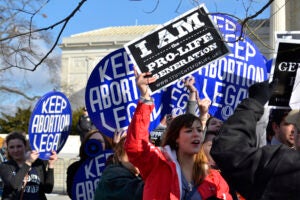
For the first time since overturning Roe v. Wade and its federal protections in 2022, the justices will revisit the abortion debate through several key cases.
Among them, a pair of cases—FDA v. Alliance for Hippocratic Medicine and Danco Laboratories v. Alliance for Hippocratic Medicine—will decide whether to restrict access to mifepristone, an abortion pill.
Meanwhile, Moyle v. U.S. will determine if a federal law requiring emergency stabilizing treatment preempts state laws prohibiting abortions, like Idaho’s Defense of Life Act.
Our Experts
Aya Gruber is a professor at the USC Gould School of Law and an expert on criminal law and procedure, violence against women and critical theory. Contact: agruber@law.usc.edu
Sofia Gruskin is an expert on global health, reproductive rights, and health equity. She directs the USC Institute on Inequalities in Global Health and has joint appointments at USC Gould and the Keck School of Medicine. Contact: gruskin@usc.edu
Dima Qato leads interdisciplinary research on equity-driven drug utilization, access and policy. Qato is chair and professor at the USC Alfred E. Mann School of Pharmacy and Pharmaceutical Sciences and a senior fellow at the USC Schaeffer Center for Health Policy and Economics. Contact: qato@usc.edu
Brian Nguyen is an associate professor of clinical obstetrics and gynecology at the Keck School of Medicine. Nguyen is an expert in family planning, reproductive health and gender equity. Contact: nguyenbt@usc.edu
Guns
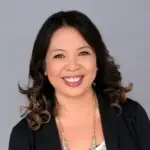 In USA v. Rahimi, the Court will decide if a federal ban on gun ownership for individuals under domestic violence restraining orders violates the Second Amendment. Other key cases include NRA v. Vullo, which will address free speech boundaries for state employees discussing gun control, and Garland v. Cargill, which will determine the legality of bump stocks.
In USA v. Rahimi, the Court will decide if a federal ban on gun ownership for individuals under domestic violence restraining orders violates the Second Amendment. Other key cases include NRA v. Vullo, which will address free speech boundaries for state employees discussing gun control, and Garland v. Cargill, which will determine the legality of bump stocks.
“Firearms are used in over half the intimate partner deaths in America. Homicide is the leadingcause of death of women who are pregnant and post-partum. One in three women will experience intimate partner violence over their lifetimes. This is a life-threatening, chronic existence for many women in this country,” said Annalisa Enrile, a teaching professor and expert on gender-based violence at the USC School of Social Work.
“We have to start taking intimate partner violence more seriously. This is not just about upholding policies to limiting access to firearms in domestic violence cases.”
Contact: enrile@usc.edu
Additional Experts
Adam Zimmerman is an expert in mass tort law whose scholarship explores how class action attorneys, regulatory agencies and criminal prosecutors provide justice to large groups of people. Zimmerman is a professor of law at USC Gould. Contact: azimmerman@law.usc.edu
Gregory Keating, professor of law and philosophy at USC Gould, is an expert in torts, legal ethics, and the law of negligence as it relates to risks of death and devastating injury. Contact: gkeating@law.usc.edu
Immigration
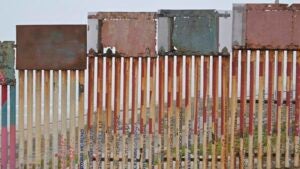
In Campos-Chaves v. Garland, the Court will decide if the government can issue a removal order for a noncitizen based on an initial notice lacking the time and place of proceedings—a ruling that could impact how deportation orders are handled and the rights of non-citizens in immigration cases.
Our Experts
Jean Reisz is co-director of the USC Immigration Clinic and clinical associate professor of law at USC Gould. A former trial attorney, Reisz combines her experience in trial advocacy and immigration law to represent individuals in removal proceedings seeking humanitarian forms of relief such as asylum, DACA, Violence Against Women Act (VAWA) visa petitions and crime victim visas. Contact: jreisz@law.usc.edu
Niels Frenzen is co-director of the USC Immigration Clinic and professor of law at USC Gould. Frenzen has represented many asylum seekers and other immigrants, has litigated federal court cases challenging the mistreatment of noncitizens and has litigated immigration court national security cases involving classified evidence. Contact: nfrenzen@law.usc.edu
Manuel Pastor, director of the USC Equity Research Center, is an expert in social justice, racial equity and immigration. Pastor is a distinguished professor of sociology and American studies & ethnicity at the USC Dornsife College of Letters, Arts and Sciences. Contact: mpastor@dornsife.usc.edu
Social Media
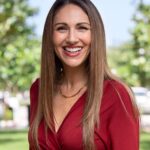 The central question in two major cases—NetChoice LLC v. Paxton and Moody v. NetChoice LLC—is whether state laws regulating social media content moderation violate users’ First Amendment rights. Experts suggest that the decisions in these cases could set a precedent for how platforms operate and users interact online, influencing everything from political discourse to misinformation control.
The central question in two major cases—NetChoice LLC v. Paxton and Moody v. NetChoice LLC—is whether state laws regulating social media content moderation violate users’ First Amendment rights. Experts suggest that the decisions in these cases could set a precedent for how platforms operate and users interact online, influencing everything from political discourse to misinformation control.
“Depending on the ruling, companies may face stricter regulations or be allowed more autonomy in controlling their online presence. Tighter restrictions would require marketers to exercise greater caution in content creation and distribution, prioritizing transparency, and adherence to guidelines to avoid legal repercussions,” said Kristen Schiele, an associate professor of clinical marketing at the USC Marshall School of Business.
“Alternatively, a ruling in favor of greater moderation powers could potentially raise consumer concerns about censorship and brand authenticity.”
Contact: kschiele@marshall.usc.edu
Additional Experts
Erin Miller is an expert on theories of speech and free speech rights, and especially their application to mass media. She is an assistant professor of law at USC Gould. Contact: emiller@law.usc.edu
Karen North is an expert on social media, social networking, internet privacy and online community standards. North is clinical professor of communications at the USC Annenberg School for Communications and Journalism. Contact: knorth@usc.edu
Wendy Wood is an expert in the nature of habit, including behaviors that influence the spread of misinformation on social media. She is provost professor emerita of psychology and business at USC Dornsife. Contact: wendy.wood@usc.edu
Morteza Dehghani is an expert political and moral language, textual and semantic analysis and morality. He is a professor of psychology and computer science at USC Dornsife. Contact: mdehghan@usc.edu
###
Presidential Immunity
 In the landmark case Trump v. U.S., the central question revolves around whether a former president can avoid facing criminal charges for actions taken while in office—a case USC experts suggest could significantly impact the November election.
In the landmark case Trump v. U.S., the central question revolves around whether a former president can avoid facing criminal charges for actions taken while in office—a case USC experts suggest could significantly impact the November election.
“The Court has not been this central to a presidential election since it decided the 2000 election in Bush v. Gore. Back then, the Court had a deep reservoir of public support. Today, its approval ratings are lagging and its legitimacy has been questioned from the left and right. The standing of the Court itself is on the docket,” said Jeb Barnes, a professor of political science at the USC Dornsife College of Letters, Arts and Sciences.
Contact: barnesj@usc.edu
Additional Experts
Christian Grose, an expert in U.S. politics and government, is a professor of political science and public policy at USC Dornsife and academic director of the USC Schwarzenegger Institute for State and Global Policy at the USC Price School of Public Policy. Contact: cgrose@usc.edu
Lee Epstein is an expert in law and legal institutions, especially the behavior of judges. She teaches courses on constitutional law, judicial behavior, free speech and the U.S. Supreme Court. Epstein is the university professor of law and political science; and Charles L. and Ramona I. Hilliard Distinguished Professor of Law at the USC Gould School of Law. Contact: lepstein@law.usc.edu
Air Pollution
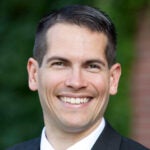
The Supreme Court is considering putting a hold on a clean air rule that requires upwind states to reduce pollution affecting their downwind neighbors.
The case, Ohio v. EPA, centers on the EPA’s Good Neighbor Plan. Three states and industry allies have petitioned the Supreme Court to block the federal rule targeting smog that drifts across state lines. Read more on USC News.
“This is the Biden Administration’s second attempt at addressing this issue, following the Clean Power Plan, which was struck down by the Supreme Court in 2022. Based on oral arguments, it appears likely that the Good Neighbor Plan will face a similar fate,” said Shon Hiatt, an associate professor of management and organization and director of the recently launched Business of Energy Transition (BET) initiative at the USC Marshall School of Business.
“If the Biden Administration loses the case, the authority to regulate the types of energy generated within state boundaries will remain with the states themselves. This means that states will continue to have the ultimate authority to decide how they generate energy.”
Contact: shiatt@marshall.usc.edu
Additional Experts
Robin Craig is an expert in environmental law, eco resilience and the law, climate change adaptation and the relationships between environmental law and public health. Craig is the Robert C. Packard Trustee Chair in Law at USC Gould. Contact: rcraig@law.usc.edu
Jill Johnston is an expert in environmental and climate justice, pollution and public health. Johnston is an assistant professor of preventive medicine at the Keck School of Medicine of USC. Contact: jillj@usc.edu
Shoheh Farzan is an environmental epidemiologist whose research focuses on the impact of environmental contaminants on maternal-child health. Farzan is an associate professor of population and public health sciences at the Keck School of Medicine of USC. Contact: sffarzan@usc.edu
Federal Agency Power
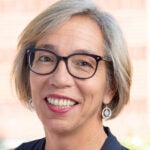 A pair of cases before the Supreme Court are challenging a long-standing legal principle known as “Chevron deference,” which grants federal agencies leeway in interpreting their regulatory authority. USC experts say that could reshape how environmental, health and consumer protection policies are made and enforced, and even threaten public health and safety. Read more on USC News.
A pair of cases before the Supreme Court are challenging a long-standing legal principle known as “Chevron deference,” which grants federal agencies leeway in interpreting their regulatory authority. USC experts say that could reshape how environmental, health and consumer protection policies are made and enforced, and even threaten public health and safety. Read more on USC News.
“This court seems to have a clear agenda to weaken or perhaps entirely dismantle the administrative state and make it as difficult as possible for agencies to do their work,” said Clare Pastore, professor of the practice of law at the USC Gould School of Law.
“Many people, even those who don’t tend to reflexively defer to agencies, have concerns about the Supreme Court eliminating Chevron and either taking control itself of critical regulatory decisions or stopping agencies in their tracks by sending everything back to Congress.”
Contact: cpastore@law.usc.edu
Additional Experts
Max Aung is an assistant professor in the Division of Environmental Health at the Keck School of Medicine of USC whose whose work has revealed the health hazards posed by PFAS or “forever chemicals.” Contact: maxaung@usc.edu
###



